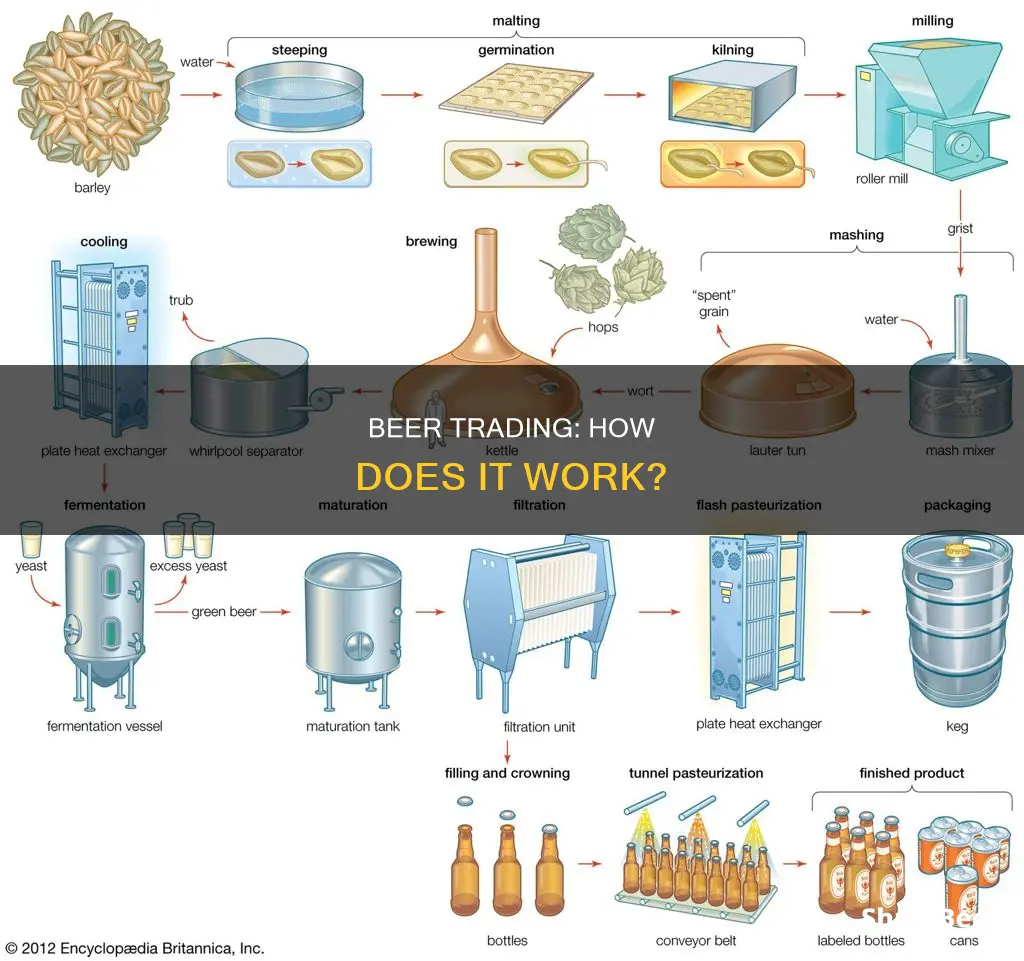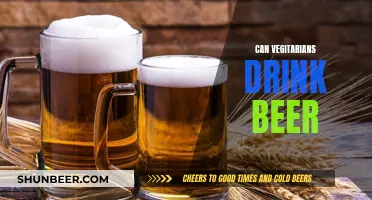
Beer trading is a popular hobby that has been going on for decades, with millions of beers exchanged around the globe. The concept is simple: trade a beer you have for one you want or one that might not be readily available in your area. However, there is a lot more that goes into it, such as knowing the etiquette, learning the language, and navigating legal and ethical challenges. Most beer trades happen online via platforms like BeerXchange, Beer Advocate, RateBeer, and Reddit. People also use social media platforms like Facebook and Instagram to find trading partners. When it comes to shipping, it's important to note that it's illegal to ship beer via the United States Postal Service (USPS). For UPS and FedEx, it's not illegal but goes against their policy to send alcohol without a license. People often get around this by stating that they are shipping something else, like artisanal olive oil or wing sauce.
| Characteristics | Values |
|---|---|
| How to find trading partners | BeerXchange, Beer Advocate, RateBeer, Reddit, Facebook groups, Instagram, Beer Exchange app, 4TradeCraft app, local meetups |
| How to initiate a trade | Post your offer and what you're looking for, using the correct abbreviations |
| Abbreviations | FT (For Trade), ISO (In Search Of), \(4\) (Dollar for Dollar), BA (Barrel-Aged), 2:1 or 3:1 (Two or Three for One) |
| Shipping | Use private companies like UPS or FedEx, disguise the sound of liquid, and don't use USPS |
| Extras | Including something extra like a sticker or another bottle is appreciated and can lead to future trades |
| Payment | No money should be exchanged, as this is illegal and will get you banned from trading sites |
| Legality | Shipping beer is illegal in the US, but people get around this by disguising the contents of their package |
What You'll Learn
- Beer trading is illegal in most situations, so it's best to use private companies like UPS or FedEx
- No money should be exchanged in beer trades
- It's important to learn the language of beer trading, including terms like ISO, FT, $4\$, and Whale
- Facebook, Instagram, Beer Advocate, Rate Beer, and apps like Beer Exchange are popular places to find fellow beer traders
- Extras like stickers or extra beers are often included in trades to balance them out or as a friendly gesture

Beer trading is illegal in most situations, so it's best to use private companies like UPS or FedEx
Beer trading is illegal in most situations. While trading beers has historically been seen as "kind of OK", it is the sale and exchange of money that becomes problematic. If you are selling a product without a liquor license or selling beer that is not distributed in a particular state, you are breaking the law. Some states also have alcohol cap laws, so if you bring in a 12% ABV beer to a state with a 6% ABV limit, for example, you are also breaking the law.
To avoid any legal issues, it is best to use private companies like UPS or FedEx to ship beer. While it is illegal to send alcohol through these services, they cannot legally open your mail and will simply return it to you if they deem it suspicious. The USPS, on the other hand, has restrictions on what can be mailed and will open packages they deem suspicious.
When shipping beer, it is important to use plain brown boxes to avoid unwanted attention and never ship in extreme weather as breakage and leakage are much more likely. It is also a good idea to include something extra in your trade, like a sticker, another bottle, or a shirt, to solidify a future trading partner.
Beer as Petrol: Can You Really Run on Hops?
You may want to see also

No money should be exchanged in beer trades
Beer trading has become a common practice among beer enthusiasts, with online communities dedicated to this activity. While these trades may involve beers of different values, it is important to remember that no money should be exchanged during these transactions. Here are some reasons why money should not be part of beer trades:
Maintaining the Spirit of Trading
Firstly, the essence of beer trading lies in exchanging experiences and sharing the love for craft beer, not profiting from it. Introducing money into the equation shifts the focus from the enjoyment of trying new beers to making monetary gains, which can detract from the camaraderie and community-building aspects of beer trading.
Legal Compliance
In most places, exchanging money for beer trades is illegal. Beer trading is meant to be a hobby among enthusiasts, not a commercial activity. By adhering to this guideline, participants can avoid any potential legal issues or complications.
Fair Value Assessment
When it comes to beer trades, determining the fair value of the beers being exchanged can be challenging. Beers may have different values due to factors such as rarity, age, or limited production. Assessing and agreeing on the monetary equivalent of these beers can be complex and often subjective. Avoiding the exchange of money simplifies the process and reduces potential disputes over the value of the beers being traded.
Community Guidelines and Reputation
Online beer trading communities, such as BeerAdvocate and various forums, have strict guidelines prohibiting the exchange of money. Offering money during trades is a sure way to get banned from these communities. Reputation is crucial in trading circles, and violating this fundamental rule can result in losing trust and access to future trading opportunities.
Ethical Considerations
Finally, it is important to respect the hard work of brewers and the local communities they serve. Buying large quantities of beer solely for trading purposes can be unethical, especially if it deprives local beer enthusiasts from enjoying their favourite brews. It is essential to strike a balance between acquiring beers for trading and leaving enough stock for local consumers who support their neighbourhood breweries.
In conclusion, while beer trading can be a fun and exciting way to explore new beers and connect with other enthusiasts, it is important to remember that money should never be part of these transactions. By adhering to this principle, traders can maintain the spirit of community, comply with legal requirements, avoid complex value assessments, preserve their reputation, and act ethically towards brewers and local beer lovers.
Do Beer Cozies Work? The Science Behind It
You may want to see also

It's important to learn the language of beer trading, including terms like ISO, FT, $4\$, and Whale
When it comes to beer trading, it's important to learn the language of the practice, including terms like ISO, FT, $4\$, and Whale. These terms are used to describe the type of trade being proposed and the value of the beers involved.
ISO, or "In Search Of", is used as a prefix to indicate that the trader is looking for a specific beer. For example, "ISO: 2013 Sierra Nevada Bigfoot" means the trader wants the 2013 vintage of that beer. FT, or "For Trade", indicates that the trader has a bottle available for swapping, such as "FT: Abyss '14". Combining these terms, a trader might post "FT: Abyss '14 ISO: One very good BA Stout 3:1", meaning they want to trade their 2014 Abyss beer for a high-quality barrel-aged stout, and they're willing to offer three of their beers for one of the desired stout.
$4\$, or "Dollar for Dollar", refers to trades where the trader is seeking a beer of roughly equivalent monetary value to the one they're offering. This is in contrast to trades that consider other factors, such as a beer's rarity, when determining its value. For instance, a trader might propose "$4$: Pliny the Elder ISO: Something similar from your region".
Finally, "Whale" is a term used to describe a highly coveted beer that's worth chasing, like a rare, elusive vintage. These are often the most sought-after beers in the trading community.
Understanding these terms is crucial for effective communication and successful trading within the beer community. It's important to know what you have and what you're looking for, as well as the value and rarity of the beers involved in the trade.
Beer Benefits for Hair: A Guide
You may want to see also

Facebook, Instagram, Beer Advocate, Rate Beer, and apps like Beer Exchange are popular places to find fellow beer traders
Beer trading has become increasingly popular with the rise of craft beer and social media. Beer enthusiasts are now able to connect with other traders and collectors through various online platforms. Facebook groups, for example, provide a space for beer traders to connect and negotiate trades. Similarly, Beer Advocate, a website dedicated to beer enthusiasts, has been facilitating beer trades since the late 1990s and has grown into one of the largest and most trusted beer trading communities. Beer Advocate allows users to access trading dashboards and community forums, as well as build their reputation through a feedback system, fostering an honest and friendly environment for traders.
Rate Beer is another long-running forum-based community that connects beer traders and enthusiasts. Additionally, Instagram has played a significant role in the beer trading community. Accounts like @TheBottleTrade and hashtags like "ISO" (in search of) and "FT" (for trade) have facilitated connections between traders, allowing them to set up swaps and exchanges.
Apps have also been developed to cater to the growing beer trading community. Beer Exchange, for example, is a platform that allows users to find, collect, trade, and track beer. It integrates with the Untappd API for user authentication and beer data, providing a seamless experience for traders. Users can search for beers they are seeking or offering for trade, and once a match is found, they can negotiate and finalise the trade. Beer Exchange also allows users to rate their trading experiences, providing accountability and peace of mind.
These online platforms and communities have transformed the way beer enthusiasts connect, trade, and collect beers, no longer restricting the thrill of the craft beer trade to niche forums and their policies.
Beer, Anxiety, and You: A Curious Concoction
You may want to see also

Extras like stickers or extra beers are often included in trades to balance them out or as a friendly gesture
Beer trading is a great way to get your hands on rare and exciting beers from across the world, and it's also about sharing what you love about your local beer scene with others. It's a fun, communal way to taste and enjoy beer, and it can be a fantastic way to make new friends.
When it comes to beer trades, extras like stickers, coasters, key chains, an extra bottle or can, or even a shirt are often included as a friendly gesture. These little extras are a great way to show goodwill and leave a good impression on your trading partner. They can also help to solidify future trading partnerships and are sometimes expected or required to balance out the trade. For example, if you're trading a rare or coveted beer, you might include some extra beers to make the trade feel more fair.
Including extras is also a great way to disguise the sound of liquid in your package. Many traders include items like candies or a handful of pennies to add a rattling sound that makes it less likely for the carrier to detect the beer.
So, if you're looking to get into beer trading, remember that it's not just about the beer. Those little extras can go a long way in making your trades more enjoyable and successful. It's a great way to build goodwill and make new friends in the beer community.
Beer Fast: Does It Work Quickly?
You may want to see also
Frequently asked questions
BeerXchange, Beer Advocate, RateBeer, Reddit, and Facebook groups are some of the popular platforms for beer trading.
It is illegal to ship beer and other alcoholic beverages by USPS. With other mail delivery services like UPS or FedEx, sending beer by mail is not advisable but remains a “do-at-your-own-risk” type of matter. It is also important to understand the language and etiquette of beer trading.
Some popular acronyms include ISO (In Search Of), FT (For Trade), $4$ (Dollar for Dollar), BBA (Bourbon Barrel-Aged), BA (Barrel-Aged), and Whale (A rare, hard-to-find beer).
Some of the most popular beers include Pliny the Younger by Russian River, 120 Minute IPA by Dogfish Head, Canadian Breakfast Stout by Founder’s Brewing, and Black Tuesday by The Bruery.
Many platforms allow users to rate and review other traders. If a trade goes wrong, your reputation might get affected. It is important to be honest and direct when trading beer.







